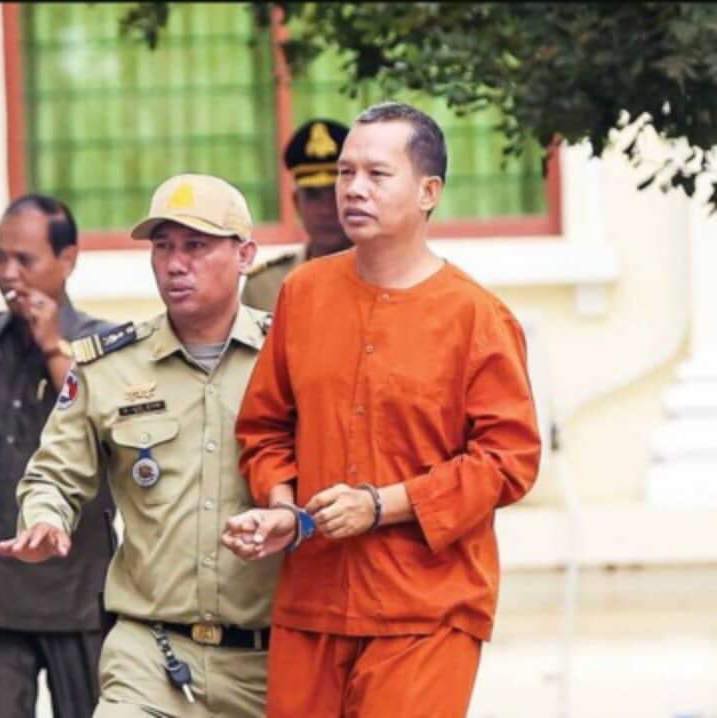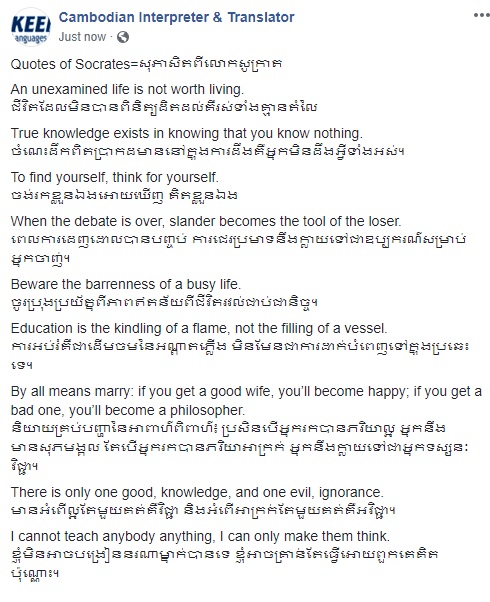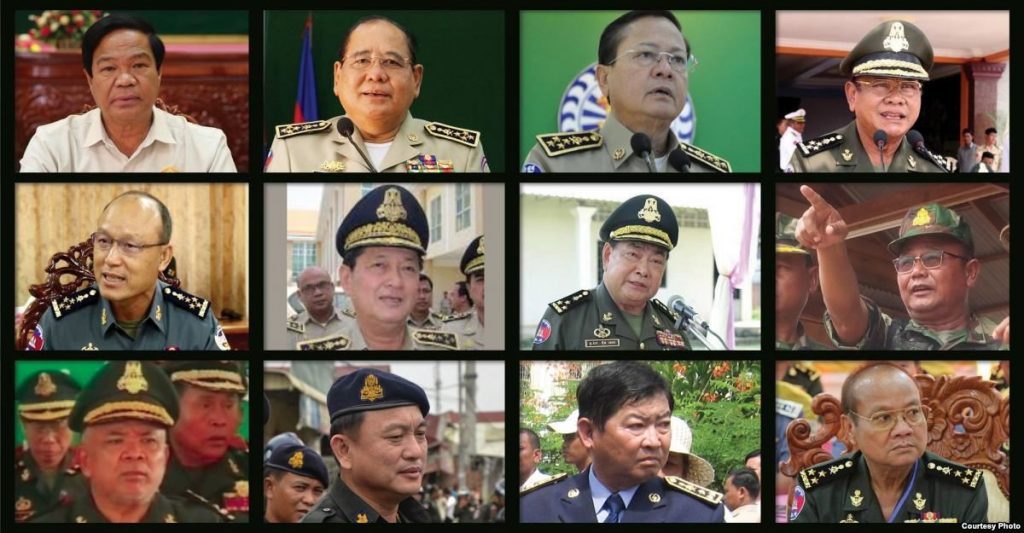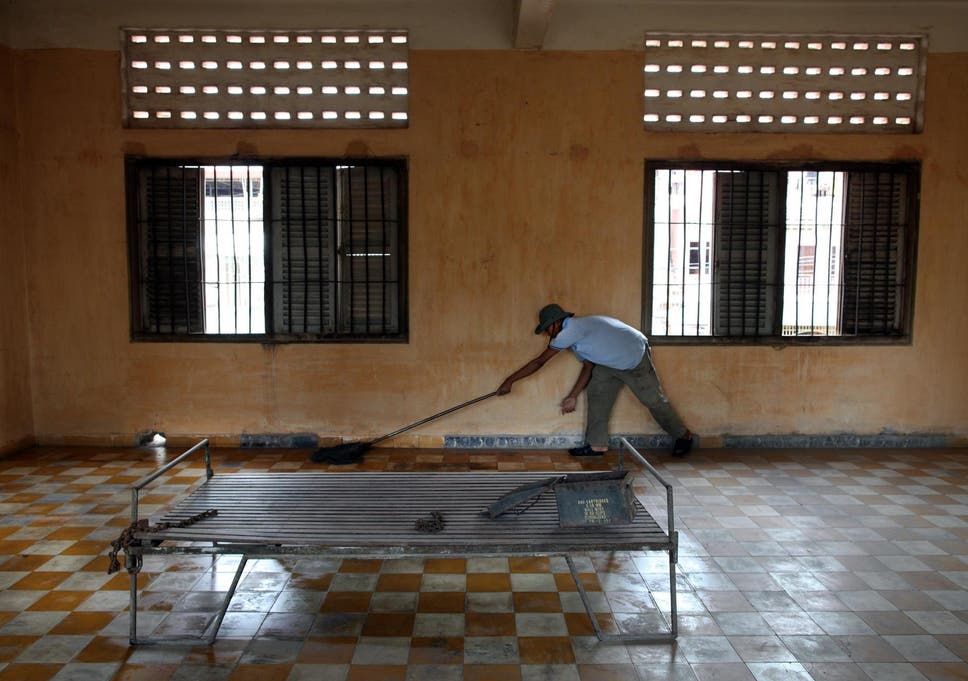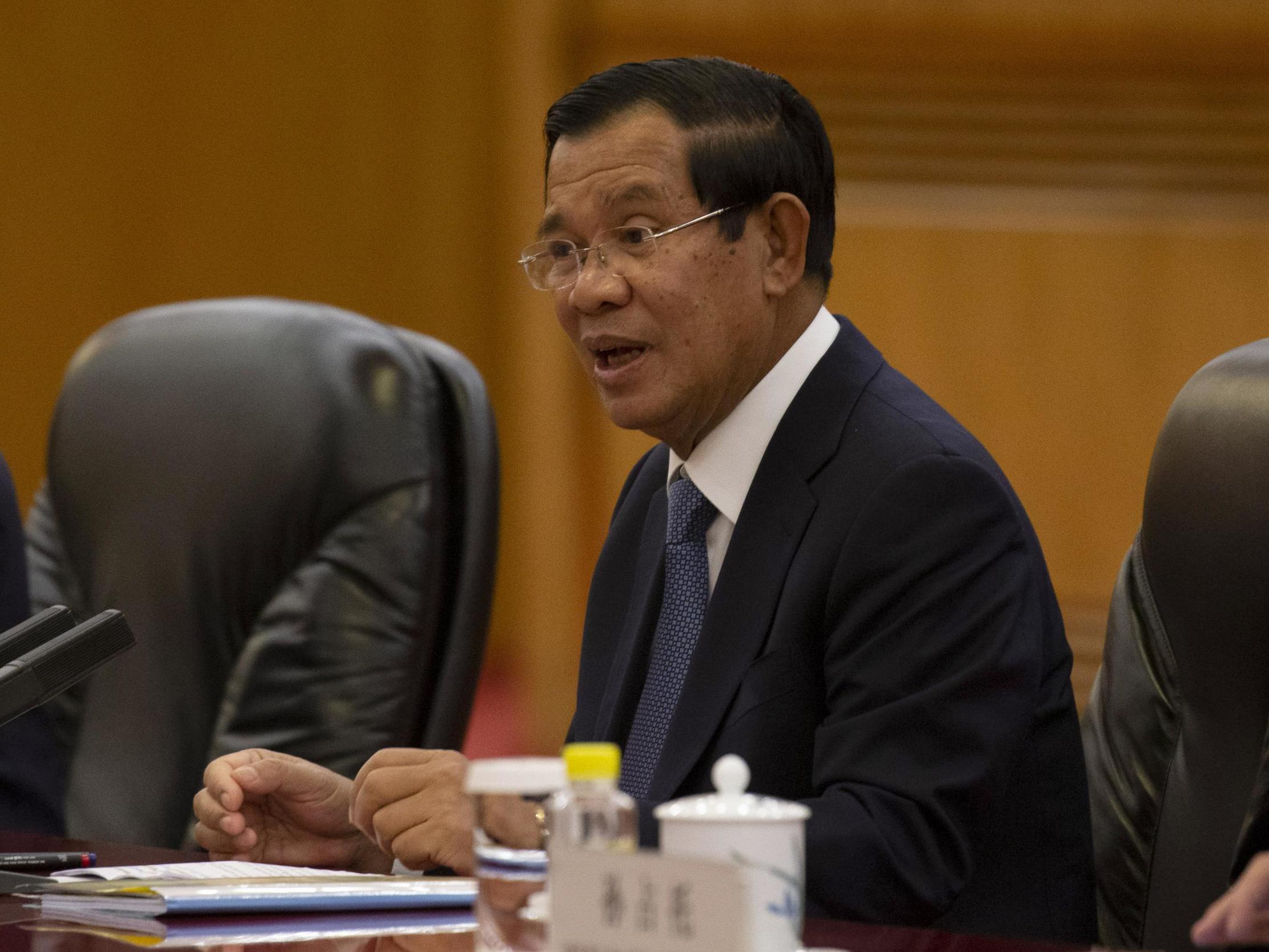As he spoke, his eyes filled with tears.
The family said they were told by prison officials that Rorn had a seizure, hit his head and died – but they dispute the story. According to Tita, Rorn had no history of epilepsy and his injuries did not seem consistent with a seizure.
After the funeral, Tita fled the village. He said police had come looking for him at his home on two occasions.
“I am scared but I want to tell the truth and I want justice,” he said.
Cambodia’s opposition faces renewed crackdown amid China shift
Op-Ed: Al Jazeera
With senior leaders jailed or exiled, local and regional supporters of opposition report attacks and harassment.by Andrew Nachemson & Yon Sineat19 May 2019
![CNRP leader Kem Sokha greets supporters on the last day of campaigning ahead of local elections in 2017. He was detained a few months later and remains under house arrest [File: Heng Sinith/AP Photo]](https://www.aljazeera.com/mritems/imagecache/mbdxxlarge/mritems/Images/2019/5/16/cc6243e3b91d4a32a59f740fbc2ebd0d_18.jpg)
MORE ON CAMBODIA
- China ‘to help’ Cambodia if EU implements trade sanctions3 weeks ago
- Gateless: A Story of Child Sex Abuse in Cambodia’s Templeslast month
- Calls grow for investigation over missing Cambodian land activistlast month
- Cambodian court issues arrest warrants for top opposition leaders2 months ago
Phnom Penh, Cambodia – Nol Puthearith was a security guard at the headquarters of the Cambodia National Rescue Party (CNRP), and continued to watch over the building in the Cambodian capital even after the main opposition party itself was forcibly dissolved by the government of Prime Minister Hun Sen.
Chinese investment brings casinos to Cambodia (2:34)
Last month, he was attacked by a group of strangers.
“They beat me until I was unconscious,” said Puthearith, who has supported the opposition and acted as a bodyguard for party leaders since the late 1990s. “I have no idea who they are and I can’t identify them.”
A week after the April 13 attack in Phnom Penh, another opposition member named Tith Rorn was taken to a police station in Kampong Cham province for questioning over a crime that had taken place more than a decade ago.
Cambodian court issues arrest warrants for top opposition leaders
While not directly related, the two events are part of what some observers see as a pattern of ongoing abuse and intimidation against political opponents of Hun Sen, exacerbated by a recent threat by the European Union to cancel its preferential Everything But Arms (EBA) trade agreement with Cambodia over its human rights record.
Hun Sen has accused the EU of holding Cambodia hostage and warned that he would renew his crackdown on the opposition if Europe did not relent.
Lee Morgenbesser, author of Behind the Facade: Elections under Authoritarianism in Southeast Asia, said that while the CNRP is officially disbanded, the government still fears its influence because its supporters have been driven underground.
“Hun Sen’s government has eliminated the threat of the CNRP at the national level, but it has much work to do at the local level,” he explained. “The problem for Hun Sen now is identifying who to repress, how to repress them and when to repress them.”
The CNRP’s leader Kem Sokha remains under house arrest after he was detained at the end of 2017 and accused of treason.
The party itself, which came a close second in the 2013 national elections and in the 2017 local polls, was dissolved two years ago on spurious allegations of attempted revolution aided by the United States. The move ensured that Hun Sen’s Cambodian People’s Party (CPP) secured every one of the 125 seats in the National Assembly in last year’s election.
Although there was a relaxation of political repression after the polls and many political prisoners were released, including 14 members of the CNRP, the attacks on opposition supporters have now resumed.
CNRP member Kong Mas, who supported cancelling the EBA, was arrested for incitement in January.
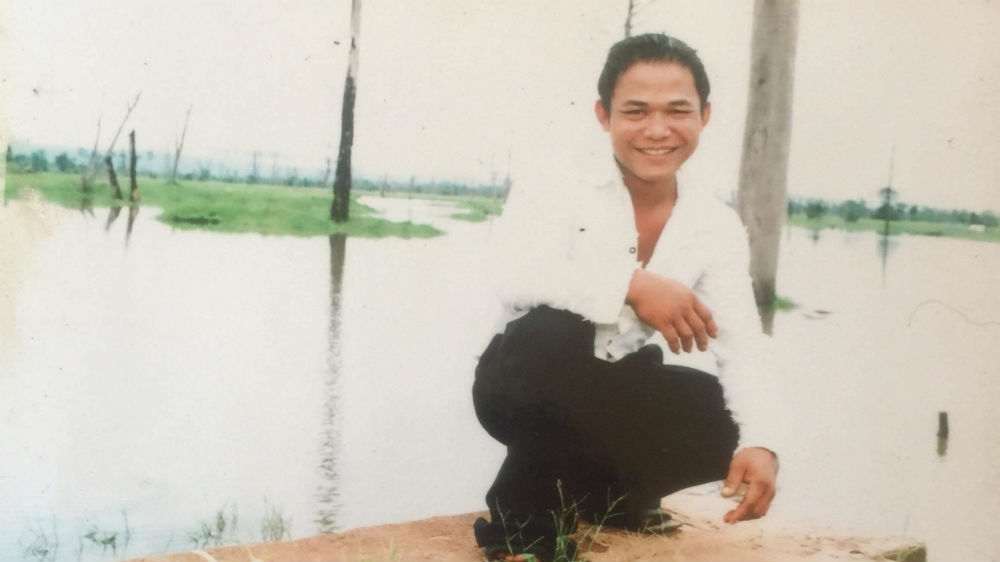
Tith Rorn, a supporter of Cambodia’s opposition CNRP who was detained over a fight that happened 13 years ago and died in mysterious circumstances in prison three days later [Al Jazeera]
Beatings, assaults
At least three individuals, including Puthearith, have been assaulted in cases the party claims are politically motivated since March.
Rorn, the CNRP coordinator, was arrested on April 15 over a fight with a pro-government activist that took place 13 years ago, well beyond the statute of limitations. He later died in prison.READ MORE
Trick or real? CNRP split over Cambodia move to ease politics ban
After the altercation, Rorn fled to Anlong Veng near the Thai border but came home from time to time. He had been living in the village for about a year when the police came for him.
“On the second day of Khmer New Year at 7:30 in the morning, police came and said they needed to take him for questioning,” his father, Eam Tita, a provincial coordinator for the CNRP in Kampong Cham, told Al Jazeera from an undisclosed location.
“After they took him for questioning, he never came back and three days later police told my neighbour that my son had died.”
As he spoke, his eyes filled with tears.
The family said they were told by prison officials that Rorn had a seizure, hit his head and died – but they dispute the story. According to Tita, Rorn had no history of epilepsy and his injuries did not seem consistent with a seizure.
“There were bruises all over his body like he had been beaten and his neck was broken,” Tita said. The family was unable to get a doctor to do an official autopsy, because doctors in the area were too scared to get involved.
After the funeral, Tita fled the village. He said police had come looking for him at his home on two occasions.
“I am scared but I want to tell the truth and I want justice,” he said.
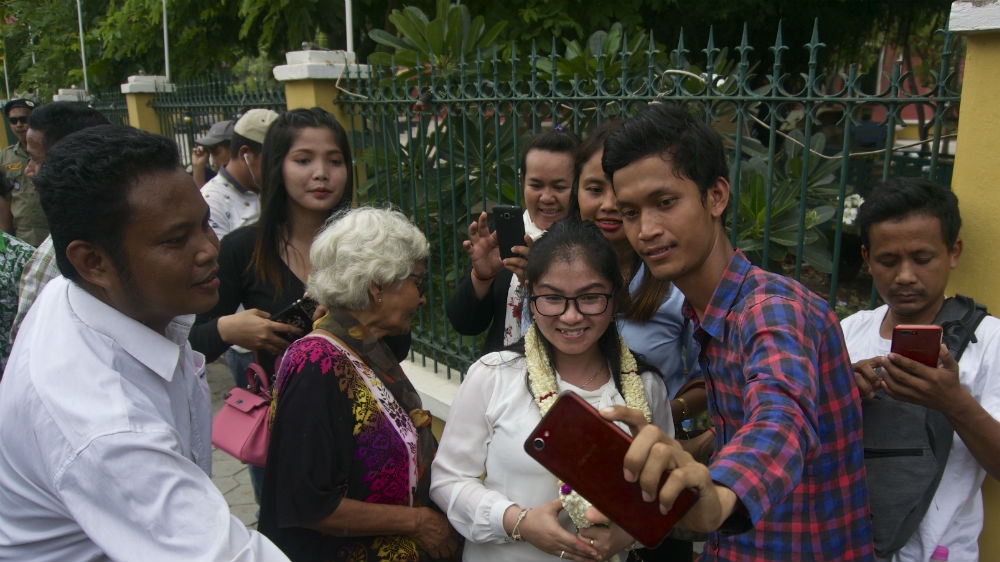
Popular opposition figure Sin Rozeth takes a selfie with a supporter after being interrogated for more than four hours by a provincial court in Battambang [Andrew Nachemson/Al Jazeera]
Strengthening grip
On May 10, Asean Parliamentarians for Human Rights (APHR), a group of MPs from around Southeast Asia, called for an independent investigation into Rorn’s death. In a statement, the group urged the Cambodian government to stop targeting members of the opposition.
“The continued attacks on the opposition shows that the government has no interest in meaningful dialogue, but is only concerned with strengthening its own grip on power,” said Charles Santiago, APHR chairman and a Malaysian MP, said in the statement.
Last week, the US State Department also released a statement expressing concern and calling for an investigation, as well as for the release of Kem Sokha.
The United Nations Special Rapporteur, Rhona Smith, has also expressed worry, noting “few tangible improvements” in the political environment.
“I remain concerned that pressure on former members of the dissolved Cambodia National Rescue Party continue unabated,” she said in a press conference at the end of a fact-finding mission on May 9.
Puthearith, the security guard, fled to Thailand after he was attacked, but he says colleagues informed him that police have come looking for him three times. He fears he might be permanently detained or worse.
“I’m very concerned for my safety, that’s why I fled Cambodia. What happened to me is politically motivated because I didn’t know those people and I also don’t have any conflict with anyone,” Puthearith said.
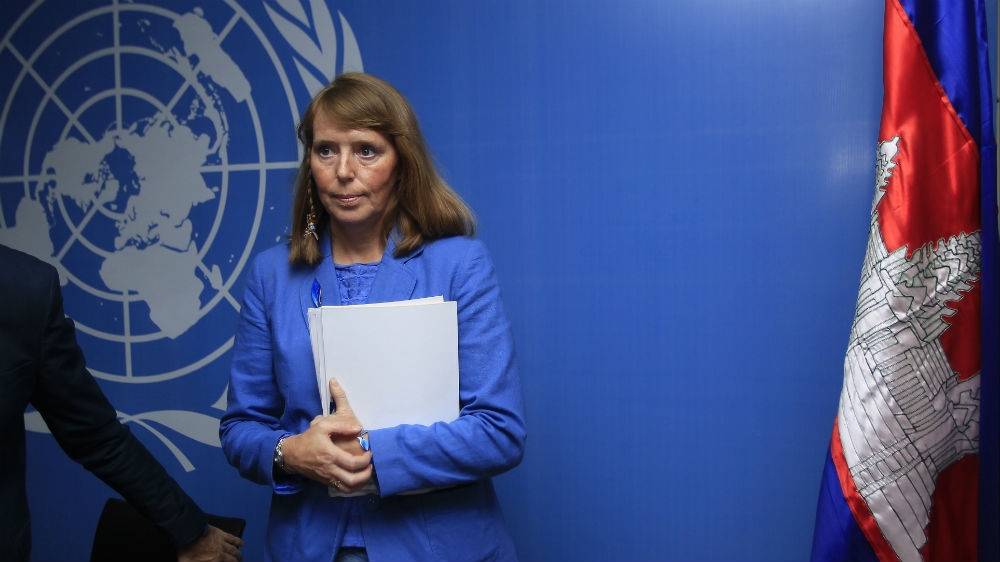
Smith: ‘I remain concerned that pressure on former members of the dissolved Cambodia National Rescue Party continue unabated’ [Heng Sinith/AP Photo]


